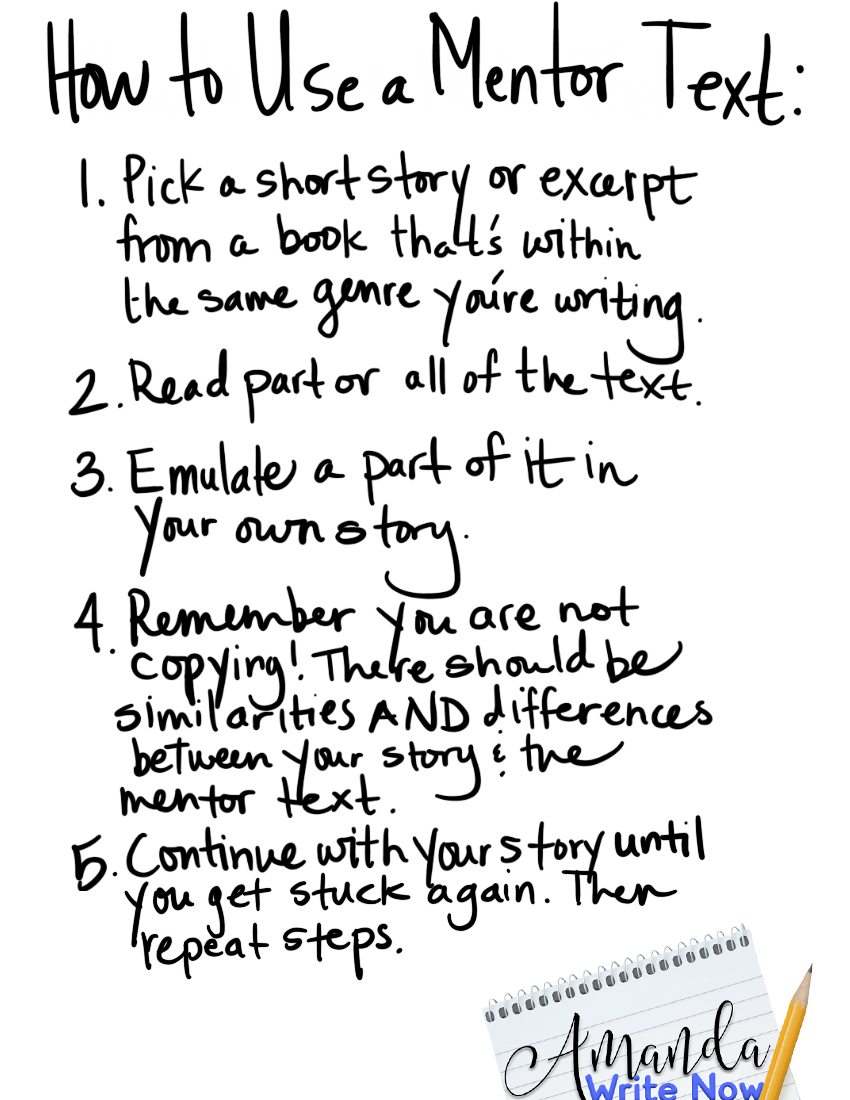
Most writing workshop teachers know what a mentor text is (examples of writing in books, short stories, articles, poems etc.). But, what about how to use a mentor text? When I scoured the internet for the answer to this pressing question I found very little. Thus…this post. I came up with a five step process for using any mentor text. I hope it inspires you to try the process yourself!
1. Choose Mentor Texts
Before each writing unit I seek as many, age and grade appropriate, mentor texts as I can find. Here are two resources that can aide you in locating quality mentor texts: Ten Places to Find Mentor Texts and Middle School Mentor Texts.
Once you’ve found as many texts as you can, then you will want to pick one that you’ll refer to most in your mini lessons. Let’s call this mentor text the capstone. The other texts should be made available for students to read and for the teacher to refer to during conferences. The texts you choose need to be within the same genre your students will be writing, it needs to be engaging and full of skills you want your students to retain and produce in their own writing.
2. Read Aloud
Before your writing unit make sure to read your capstone mentor text aloud. This guarantees that all students hear and read the whole text. Don’t make students do anything except follow along. Read with expression and don’t stop until you’ve finished the whole thing. I know this can be difficult for teachers. We want to stop and explain, teach or question comprehension. Don’t do it. Don’t ruin the experience of the first read through. If it’s hard for you to do this, just remember you are going to be rereading and talking about this text a lot after this first read, so just read, don’t talk.
3. Choose a Writing Skill
After you’ve done one cold read through of the capstone text and launched your unit it’s time to teach your first writing mini lesson. What will this lesson be about? There are many, many skills to teach when it comes to writing. Let’s say you’ve chosen to teach how to develop characters. You’ll want to pick parts from your mentor text that describe characters or include inner thinking, action or dialogue. All of this reveals character. Read parts of the mentor text out loud and analyze the techniques of the author when it comes to character development. Then, try to emulate in your own writing…
4. Emulate
During each writing unit you need to have your own piece of writing in progress. This piece of writing does not have to be complete and it definitely doesn’t need to be perfect. Writing in front of your students is a powerful way to reveal that writing is a struggle for all of us. This can relieve so much tension some students have about their writing.
Emulating mentor texts may seem hard but it is actually quite simple. All you have to do when you emulate a mentor text is use words/phrases from the mentor text in your own writing and change it up to make it your own.

For example here is a sentence from The Jacket by Gary Soto:
“I remember the green coat that I wore in 5th and 6th grades when you either danced like a champ or pressed yourself against the greasy wall, bitter as a penny toward the happy couples.”
Here is my emulation sentence about some shoes:
“I remember those black Airwalk shoes that I wore in 7th and 8th grades when you either skated like a pro or quit after a week because you were too scared of breaking your face.”
See how similar but different these two sentences are? This is emulation.
5. Repeat
As you can see, using mentor texts is a pretty simple process. All you have to do is choose a skill, read a part of the mentor text that exhibits that skill and try it in your own writing. That’s it. It’s that simple. Once you’ve finished a unit repeat the process with another genre of writing.
Your Turn!
Do you use mentor texts? If so, in what ways do you use them? Tell us in the comments below!
Favorite Books
These are Amazon Affiliate links. This means that if you buy these books by clicking the link I will get a commission.
Related Articles
Ten Places to Find Mentor Texts
Differentiate Writing Instruction



Thank You!
As I sit the night before my presentation and feeble lesson plans, (along with personal understanding) for 7th grade ELA requirements on writing styles, character development, etc. I stumbled upon your website and sat happily gorging on your informative offerings and exhaling feeling saved.
I have failed to mention I work in a low income rural district and have been asked to teach everything from Life Skills, to High School Biology/ U.S. History/ Government in a single year and this year MS Language Arts. Your site is the best thing I have found and you are a true gift to the profession!
Hi Overwhelmed, woah! That’s too many subjects to expect one person to teach! I’m appalled. I hope you are doing alright. I apologize it took so long to say thank you for your kind words of encouragement to keep doing what I’m doing. I appreciate you and I hope your school leaders and students do too:)